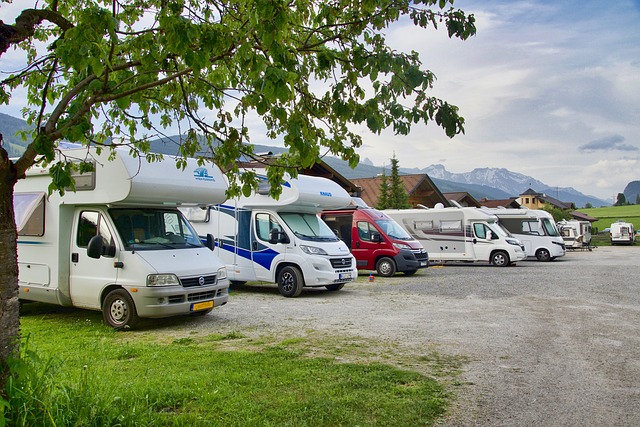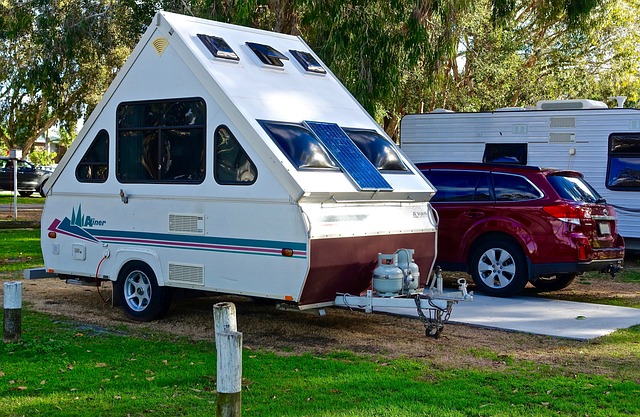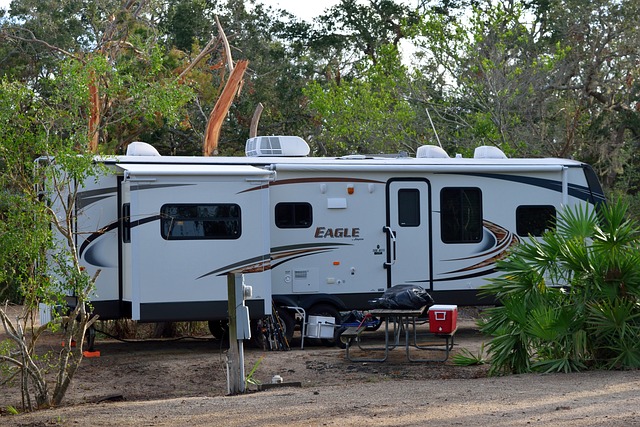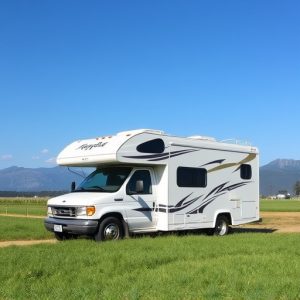Green Roads: Sustainable RV Travel Tips for Eco-Friendly Journeys
When embarking on sustainable RV travel, prioritize staying at eco-conscious RV parks that support …….

When embarking on sustainable RV travel, prioritize staying at eco-conscious RV parks that support conservation and biodiversity, offering energy-efficient amenities, solar panels, and water conservation systems. These parks also feature organic waste management and recycling programs, preserving natural landscapes with native plants. By choosing such green spaces, RVers can ensure their travels positively contribute to environmental stewardship. Integrating sustainability into your journey involves adopting practices like using solar power with PV panels, high-efficiency appliances, LED lighting, and proper insulation to minimize energy use. Water conservation is equally important, achievable through low-flow fixtures, repurposing greywater, and utilizing campground amenities efficiently. Waste management in RVs should focus on composting toilets for handling waste and diligent recycling efforts. Eco-friendly driving habits like efficient route planning, steady speeds, and regular vehicle maintenance can reduce fuel consumption. Selecting sustainable campgrounds that use renewable energy and support local economies further promotes environmental conservation while enriching cultural experiences. Implementing these RV Travel Tips leads to a journey that is both enjoyable and responsible, contributing to the preservation of natural habitats and fostering an awareness of the importance of ecological integrity.
Embark on a green journey with our comprehensive guide on eco-friendly practices for sustainable RV travel. This article offers valuable RV Travel Tips, from choosing an eco-conscious RV park that embraces green spaces to harnessing clean energy via solar power and improving energy efficiency on the road. Learn practical water conservation techniques to maintain comfort without waste, explore waste management solutions like composting toilets and recycling, and master eco-friendly driving habits that minimize your carbon footprint. Additionally, discover how to support local economies and ecosystems while enjoying campgrounds across diverse landscapes. With these sustainable choices in tow, your RV adventure can leave a light footprint and a lasting impression.
- Embracing Green Spaces: Selecting an Eco-Conscious RV Park
- Solar Power and Energy Efficiency: Harnessing Clean Energy on the Road
- Water Conservation: Tips for Reducing Usage While Maintaining Comfort
- Waste Management: Composting Toilets and Recycling Best Practices for RVers
- Eco-Friendly Driving Habits to Minimize Your Carbon Footprint
- Sustainable Choices in Campgrounds: Supporting Local Economies and Ecosystems
Embracing Green Spaces: Selecting an Eco-Conscious RV Park

When embarking on sustainable RV travel, the choice of accommodation plays a pivotal role in minimizing one’s environmental footprint. Opting for an eco-conscious RV park is a decision that aligns with the ethos of eco-friendly practices. These green spaces are dedicated to preserving natural habitats and promoting conservation efforts. They often feature energy-efficient facilities, solar panel installations, and water conservation systems, all of which reduce the ecological impact of RV travelers. In addition to these sustainable infrastructure elements, eco-friendly RV parks frequently offer organic waste management services, recycling options, and encourage local biodiversity by maintaining native landscapes. By choosing an RV park that prioritizes green initiatives, travelers can be confident that their journey contributes positively to environmental stewardship. In doing so, they not only enjoy the beauty of nature but also support a network of like-minded individuals and businesses committed to responsible RV travel. It’s these small yet impactful decisions that collectively contribute to a more sustainable future for outdoor enthusiasts and the planet. RV Travel Tips suggest that integrating eco-conscious choices into your itinerary can transform an ordinary trip into an environmentally friendly adventure.
Solar Power and Energy Efficiency: Harnessing Clean Energy on the Road

Embarking on sustainable RV travel means embracing eco-friendly practices that minimize your environmental footprint while enjoying the freedom of the open road. A pivotal aspect of this approach is leveraging solar power for energy needs, which reduces reliance on fossil fuels and promotes a cleaner travel experience. RVers can harness the power of the sun through photovoltaic (PV) panels installed on their vehicles’ roofs or portable setups. These panels convert sunlight directly into electricity to power various appliances and devices, from refrigerators to laptops, making off-grid living a reality. To maximize energy efficiency, consider the following RV travel tips: select high-efficiency appliances that consume less power, use LED lighting, and insulate your RV to retain heat in cold climates or keep it cool during hot weather. By doing so, you not only extend the time your solar system can sustain your power needs but also contribute to a smaller carbon footprint. Implementing these energy-saving measures ensures that your RV journey is as sustainable as possible, allowing you to enjoy the beauty of nature while traveling responsibly.
Water Conservation: Tips for Reducing Usage While Maintaining Comfort

When embarking on sustainable RV travel, water conservation is paramount for preserving our planet’s precious resources while maintaining the comforts of home. To effectively manage water usage within an RV, consider implementing a variety of eco-friendly practices. Firstly, installing low-flow fixtures such as showerheads and faucets can significantly reduce water consumption without compromising on pressure or performance. These fixtures are designed to use less water per minute compared to traditional models, which means you’ll be using RV travel tips for water conservation in real-time. Additionally, employing greywater for non-potable uses, like irrigation for plants or flushing toilets, can repurpose a valuable resource and minimize freshwater usage. Always ensure that your RV is properly insulated to prevent leaks and make sure that all taps are fully closed to avoid drips. By adhering to these RV travel tips, you’ll be able to enjoy your journey while also contributing positively to the sustainability movement. Remember to take advantage of available facilities at campgrounds that encourage water-saving practices, such as communal showers and laundry services, which can further reduce your water footprint. With mindful RV travel tips for water conservation, you can maintain comfort without compromising on environmental stewardship.
Waste Management: Composting Toilets and Recycling Best Practices for RVers

When embarking on sustainable RV travel, responsible waste management is paramount. RV travel tips often highlight the importance of composting toilets as a cornerstone of eco-friendly practices. These systems break down human waste naturally, transforming it into compost rather than sewage. This process not only conserves water but also reduces the environmental impact associated with traditional sewer systems. RVers should familiarize themselves with the type of composting toilet in their RV and learn how to maintain it properly, including understanding what can and cannot be composted. Regular monitoring of moisture levels and adding appropriate composting materials are key to keeping the system functioning optimally.
In addition to composting toilets, recycling is another critical component of sustainable RV travel. RVers should adopt recycling best practices tailored for life on the road. This includes separating waste into categories such as paper, plastic, glass, and metal. Adequate facilities may not always be available, so it’s essential to plan ahead. Keep a well-labeled recycling bin inside the RV and dispose of recyclables at designated centers during stops. Minimizing waste generation through thoughtful consumption choices also contributes to sustainability. By choosing products with minimal packaging and reusing items, RVers can significantly reduce their environmental footprint while traveling. Embracing these RV travel tips not only supports the health of our planet but also enhances the experience of living and traveling in harmony with nature.
Eco-Friendly Driving Habits to Minimize Your Carbon Footprint

Engaging in eco-friendly driving habits is a cornerstone of sustainable RV travel, as it directly influences your carbon footprint. To minimize this footprint while on the road, it’s crucial to optimize your vehicle’s efficiency. Plan your routes to avoid unnecessary detours and backtracking; efficient route planning can significantly reduce fuel consumption. Additionally, maintaining a steady speed is more efficient than frequent accelerations and decelerations, so adhere to speed limits and smooth out your acceleration patterns.
Furthermore, RV travel tips include practicing defensive driving by keeping a safe following distance and anticipating road conditions. This not only ensures your safety but also helps in conserving fuel. Regular vehicle maintenance is another key practice; ensuring tires are properly inflated, the engine is tuned, and the vehicle is well-maintained can improve your RV’s overall fuel economy. Consider carpooling with other RVers when possible, or offset your carbon emissions by investing in carbon offset programs. These eco-friendly driving habits not only contribute to sustainability but also enhance the overall RV travel experience. Implementing these tips can help you reduce your environmental impact and set a positive example for fellow travelers.
Sustainable Choices in Campgrounds: Supporting Local Economies and Ecosystems

When embarking on eco-friendly RV travel, selecting campgrounds that align with sustainable practices is crucial for minimal environmental impact and supporting local ecosystems. RV travelers can contribute positively to local economies by choosing campgrounds owned or operated by residents of the area, ensuring that their tourism dollars benefit the community directly. These establishments often prioritize conservation efforts, such as water preservation systems, responsible waste management, and native plant landscaping, which not only preserve the local environment but also create jobs and foster stewardship within the community. By patronizing these campgrounds, RVers help maintain the natural beauty of the area, making it a haven for both visitors and wildlife.
Furthermore, RV travelers can enhance their sustainable journey by utilizing campsites that practice sustainable energy use, such as those with solar-powered facilities or offering hookups to green power grids. These campgrounds often provide educational resources on local flora and fauna, promoting awareness and appreciation for the environment. Engaging in RV travel tips that emphasize sustainability not only ensures the preservation of natural habitats but also enriches the cultural tapestry of the destinations visited. By making conscious choices, RVers can play an active role in sustaining the delicate balance between economic growth and environmental conservation.
Incorporating eco-friendly practices into RV travel is not only beneficial for the environment but also enhances the overall experience of exploring new destinations. By choosing RV parks that prioritize green spaces, adopting solar power solutions, and practicing water conservation, RVers can significantly reduce their environmental impact while on the road. Waste management through composting toilets and diligent recycling further minimizes the carbon footprint left by travelers. Additionally, conscious choices to adopt eco-friendly driving habits and support local economies and ecosystems are key to sustainable RV travel. Embracing these tips can make a world of difference, ensuring that the beauty of the destinations we visit remains for future generations to enjoy. For those looking to embark on sustainable journeys, these RV travel tips serve as a practical guide to responsible adventure.







